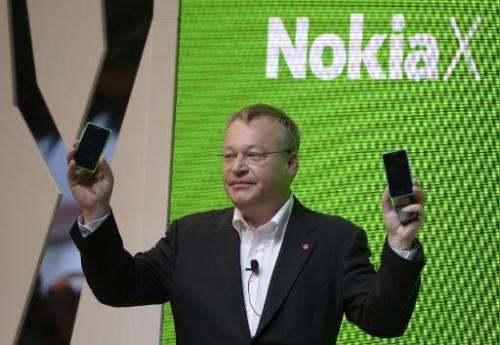New Microsoft-Nokia smartphone is... Android (Update)

Microsoft on Tuesday opted for the Android operating system from arch rival Google for its new Nokia smartphone, in a move aimed at regaining momentum in the competitive mobile sector.
Microsoft said the Nokia X2 was "designed to introduce the 'next billion' people to the mobile Internet and cloud services."
The device is an updated version of a phone unveiled by Nokia before Microsoft acquired the handset division of the Finnish giant.
It will be sold worldwide as a dual-SIM phone at a price of $135 (99 euros), Microsoft said in a statement.
While Microsoft has been struggling to get a foothold in the smartphone market with its Windows Phone operating system, the X2 "provides access to a world of Android apps and popular Microsoft services," the statement said.
Even though it uses the rival Android platform, the X2 offers "a gateway to Microsoft services," including the Skype messaging program and OneDrive cloud storage.
The initial Nokia X was unveiled at the Mobile World Congress in Barcelona in February before Microsoft completed its takeover of Nokia's handset division in April.
The new version cuts the price of a phone that has had success in some countries.
"The Nokia X family is going from strength to strength, with the Nokia X smartphone achieving top-selling status in Pakistan, Russia, Kenya and Nigeria, while earning the third best-selling smartphone spot in India," said Timo Toikkanen, head of mobile phones for the Microsoft Devices Group.
With the Nokia X unveiled in February, Android applications work but users cannot access Google's services, notably its applications store, Google Play.
Tuesday's statement said users would have access to the Nokia Store as "the place for finding the highest-quality Android apps" for the device.
Windows Phone has managed to get only around 3.5 percent of the global smartphone market, while Android has more than 80 percent, according to recent figures from research firm IDC.
'Brilliant' move
Bob O'Donnell, founder of Technalysis Research, said Microsoft will get benefits from this strategy.
"It's counterintuitive to most people but I think it's a brilliant move," O'Donnell told AFP.
"What they are doing is breaking the services from the platform and showing that services can exist on multiple platforms."
This means that even though the operating system will be Android, revenue-producing services like email, search and maps will be from Microsoft instead of Google.
"It's interesting and clever," O'Donnell said. "Even as they build the Windows Phone share, they can build the Windows services share."
Roger Kay, analyst with Endpoint Technologies, said the Android phone makes sense in view of the fragile position of the Windows Phone platform.
"Google has the dominant platform and Apple is number two, so there is a question about whether there is room for a number three," Kay said.
He added that the Nokia unit appears to be maintaining some independence after being acquired by Microsoft and that "they want to sell as many phones as possible."
"Microsoft is hanging onto the phone business by its fingernails," he said. "One bump and they could be gone. You still have a whole phone business in Nokia so it makes sense to be on the dominant platform."
Microsoft closed the deal in April with some adjustments from the announced price of $7.52 billion (5.44 billion euros).
Nokia was the world leader in mobile phones before the introduction of Apple's iPhone in 2007 and the onslaught of Android phones, mainly from Samsung.
© 2014 AFP





















